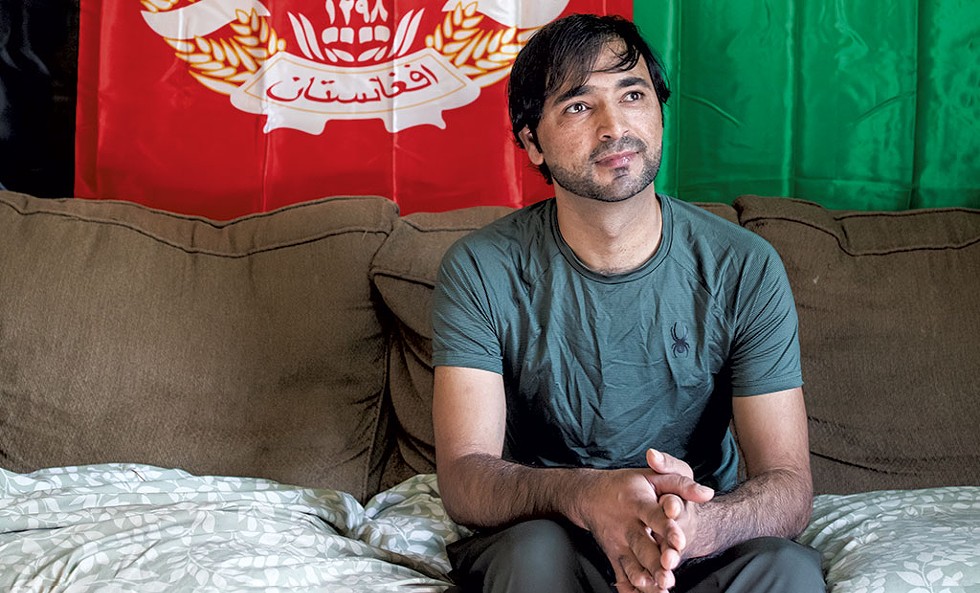
- Luke Awtry
- Rafiqullah
The dreaded news came as Zarghoona Jalalzoy's normally short commute through Kabul stretched to two hours.
The Taliban have entered the city, the frantic caller told Jalalzoy, then a senior adviser to Afghanistan's parliament. If they find you, they will take you.
That explained the traffic. Jalalzoy clambered from her government car, covered her face and laptop with a makeshift burka, and hurried home on foot in scorching summer heat. Beneath her disguise, Jalalzoy wept the whole way.
It was August 15, 2021.
Elsewhere in the country's capital, Anisa Rasooli faced similar peril. Rasooli, a trailblazing female judge known as the Ruth Bader Ginsburg of Afghanistan, had been hiding in a nephew's apartment after fleeing her own home. Now she sneaked glances from a seventh-floor window at truckloads of bearded gunmen prowling below, her country's new de facto rulers.
Want to support Afghans living in Vermont?
The Vermont Afghan Alliance, based in Burlington, provides case management, classes and employment assistance. Visit vtafghanalliance.org/volunteer or email [email protected].
The Ethiopian Community Development Council supports Afghan resettlement in Bennington and Brattleboro. To volunteer, visit ecdcvt.org/volunteer. To make a financial contribution, visit ecdcvt.org/support.
Based in Colchester, the U.S. Committee for Refugees and Immigrants' Vermont office has helped settle refugees from around the world since 1980. Learn more at refugees.org/uscri-vermont.
Word of the government's swift collapse spread 150 miles southeast to a bleak mountain region where Afghan paramilitaries worked in support of American forces and the war they had led for the previous two decades. There, a soldier called Amir was instructed to hurry to Kabul for evacuation from the country.
Amir would trudge two and a half hours across the dusty city of Khost to spend that night with his wife and children. He set out the following morning, unsure when, if ever, he would see them again.
All three Afghan nationals, who had been part of the foreign-led effort to remold their nation after the U.S. invasion in 2001, would find an exit, surviving the deadly pandemonium at Kabul's sprawling airport as thousands of their compatriots desperately sought escape. (Jalalzoy's departure would be delayed for weeks by a suicide bombing that killed nearly 200 people, including 13 American service members.) Their paths would carry them through different intermediate stops — Qatar, Poland, Turkey — and eventually to the U.S., three souls among the more than 150,000 Afghan refugees who made up the biggest wartime influx since Vietnam.
Jalalzoy, Rasooli and Amir now live in Vermont, along with some 600 other displaced Afghans who are clustered mainly around Burlington, Bennington and Brattleboro. In recent months, Seven Days reporters spoke with more than a dozen of these recent arrivals as they navigated the language and rituals of this country. They are a varied lot, representing Afghanistan's distinct regions, ethnic roots and social classes — even different languages. The group includes interpreters who worked for the American military; well-heeled former government officials and their families; women who broke through gender barriers under Western-sponsored reforms; and members of an allied paramilitary force who cannot read or write in their native languages.
Some of the newcomers, embraced by neighbors, are beginning to change the face of their communities. They are attending local high schools and colleges, launching businesses, and filling jobs at hospitals and construction sites where workers were urgently needed.
They are dismayed, too, as news from Afghanistan carries fresh word of a tightening Taliban clampdown that has outlawed even the sound of a woman's voice. You can hear frustration from those who live largely in the shadows here, working graveyard shifts and crowded into joyless apartments as they wait for a bewildering U.S. bureaucracy to decide whether their loved ones will ever join them.
It is a loaded moment. The disastrous American withdrawal that prompted the evacuations three years ago is in the news again — a point of noisy debate in a political campaign over which presidential administration merits the stain of failure.
Overlooked amid that clamor, freshly minted Vermonters like Jalalzoy, Rasooli and Amir are stitching new lives in as many different ways as there are newcomers, each one a reminder of the grandiose promises this country once dared to offer them. Here are some of those stories.
Girls and Women, Interrupted
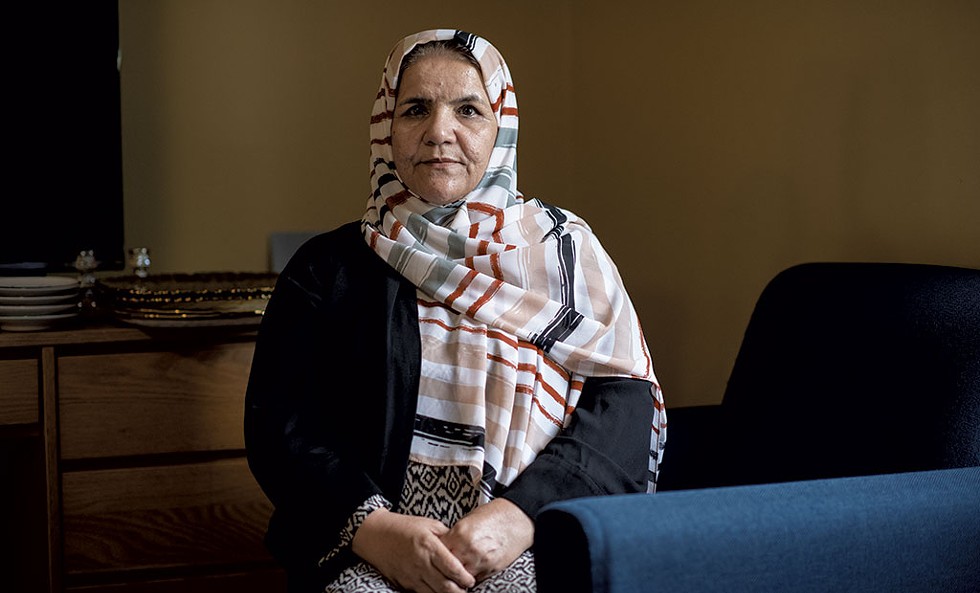
- Daria Bishop
- Anisa Rasooli
A spare, tidy apartment on the campus of Saint Michael's College is home to the woman who was once the most powerful female judge in Afghanistan.
Anisa Rasooli, 55, now spends her days taking morning strolls on the school's leafy grounds and attending English and driving lessons through the Vermont Afghan Alliance, a Burlington nonprofit that acts as a clearinghouse of services for evacuees. She is boning up on American legal terminology in case she is able to work in the field of law again one day. Rasooli keeps up with news from her home country and connects with former colleagues around the world via video calls.
Not long ago, she was at the pinnacle of her career as a jurist. She presided over various courts in Afghanistan, including ones that focused on corruption, violence against women and matters involving youths. Rasooli headed a commission that investigated conditions in women's prisons, and she taught classes to law students. She was also the first and only woman nominated — twice — to her country's Supreme Court. Her first bid fell short in the Afghan parliament; a second nomination was pending when the Taliban took over three years ago.
Her professional accomplishments are precisely what made it critical for Rasooli, and her family, to leave Afghanistan when U.S. forces hurriedly withdrew. The country's approximately 270 female judges were not only targets of the new government but also faced possible retribution from the thousands of prisoners that Taliban leaders released from jail when they swept into power.
Now, Rasooli is among the hundreds of Afghans living in Vermont who have escaped the reign of the Taliban — and the oppression of women it has wrought.
Though Rasooli has lost the career she worked hard to build, she said she is grateful to be in a place that has been safe and welcoming. But as with many other Afghan women who have left, her tentative sense of relief is tempered by deep sadness over the controls that the Taliban has unleashed against women still there.
"The women back in Afghanistan never escape my mind," Rasooli said in Dari, through an interpreter. "Sometimes I wish I were there to stand with them in their protest and to be able to fight the brutality of the system."
It is a brutality that has gotten progressively worse since Rasooli fled. Just last month, the Taliban's so-called Ministry for the Propagation of Virtue and Prevention of Vice issued a morality law that prohibits women from leaving their homes without a male guardian or raising their voices in public or at private gatherings. Females are not allowed to drive nor to attend school beyond age 11. Women have vanished from most professions, including public office and Rasooli's former world, the judiciary. Human rights activists seeking to generate international condemnation say the strictures amount to gender apartheid.
Born in 1969, Rasooli came of age during a period widely considered as Afghanistan's golden age because of the peace and relative prosperity the country enjoyed. In 1985, she sat for the national university's entrance exam, known as the Kankor, and scored a near-perfect mark, enough to qualify for study at Kabul University to become a judge. She had envisioned this career path since she was a young girl, following in the footsteps of a favorite older brother.
In 1996, when the Taliban took over for the first time, Rasooli spent a year in Pakistan to escape the instability it created, then moved back to her home province, Parwan, to help open a school for girls. It was after the U.S. began its occupation in 2001 — and invested millions in programs to end corruption in the country's judicial system — that her legal career took off.
Rasooli would visit courts in Vermont and Washington, D.C., as part of a program sponsored by the International Association of Women Judges. The program's director, Patricia Whalen, was a retired family court magistrate in Vermont and had served on an international war-crimes tribunal for Bosnia and Herzegovina.
Rasooli was struck at the time by the generous treatment she received from Vermonters, including an ice-cream truck worker who gave the visiting judges free treats. More importantly, she kept in regular touch with Whalen, a connection that would later prove critical.
In August 2021, a month before the U.S. forces were scheduled to withdraw, Afghan forces crumbled before the Taliban in city after city. Rasooli was hiding out at her nephew's apartment when she spoke with Whalen by video call about the rapidly deteriorating situation.
The next morning, Whalen began activating a network of female judges from around the world to help get their imperiled Afghan colleagues to safety. They set up a round-the-clock helpline, created a database to which the judges could upload their documents and began seeking help from government officials from all over.
Rasooli and nine family members made it to the Kabul airport days later and, with the help of Polish Special Forces, were evacuated to Poland the next day. There, they lived in limbo in the capital city of Warsaw for more than a year and a half as they tried to secure permission to enter the U.S. They made it to Vermont in May 2023. Soon after, they settled into several units of a red-brick apartment complex that also houses St. Mike's juniors and seniors.
Despite her humble conditions, Rasooli has managed to replicate some of the comforts of her old life: heaping bowls of cherries and pears that she offers to visitors, the tasteful gold jewelry she wears, pistachios and wrapped chocolates that fill a dish on a blocky, dorm-style side table.
Unlike many fellow refugees from Afghanistan, Rasooli is surrounded by an abundance of family. Although the judge never married or had children, two nieces who also fled Afghanistan in 2021 recently moved in with her to attend St. Mike's. A third niece, a medical school student in Afghanistan who now works as a medical assistant at the University of Vermont Medical Center, and her husband also live in the unit. A sister-in-law, who was a surgeon in Afghanistan, lives in a separate college apartment a few doors down with three children who attend public schools in Colchester; her older son just started his first year at Champlain College.
On a recent evening, some of those family members dropped into Rasooli's apartment with the common Arabic greeting, Salaam alaikum, or "Peace be upon you." They sat on blue college sofas and dining chairs in Rasooli's living room, trying to put into words both the loss and opportunity that now mark their lives.
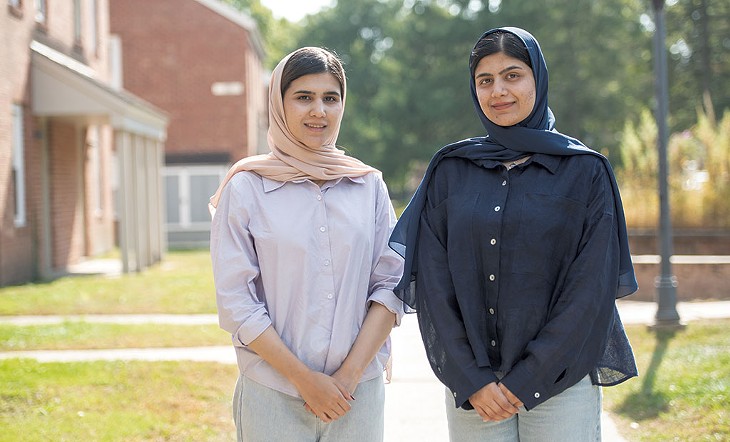
- Daria Bishop
- Sisters Waslat and Manizha Rasoli
The judge's 20-year-old niece, Waslat, who renders the family name in English as Rasoli, recalled taking her college-entrance exam just months before the U.S. pullout. Rasoli's score qualified her to study economics, but it was evident that pursuing higher education would be impossible under Taliban rule. Other young women who took the same exam and remain in Afghanistan have been told by family members to get married and stay home, the niece said.
Weeks ago, she began studying computer science at St. Mike's alongside her 23-year-old sister, Manizha, who is concentrating in engineering.
When the sisters tell fellow students they're from Afghanistan, "they open their eyes and say, 'Oh,''' Waslat Rasoli said. "We know that maybe they think of American movies. We say, 'No, we have beautiful places, too.'"
Beautiful places such as Parwan, the rural province two hours outside Kabul where the Rasooli family claims roots. Family members recall it as a lush area, with trees heavy with pomegranates and vines thick with grapes. In happier times, the extended Rasooli clan would gather by the river to picnic at the large family compound for birthdays and holidays. Now, they visit only in their minds.
For a younger generation of women without memories of the Taliban's earlier reign, the collapse has brought to life the grim accounts told by their parents. Sama Pardis, who has resettled in Colchester, recalls her mother, a public health official, telling her how bad things had been for women before 2001. But to Pardis, now 25, those were stories from a bygone time, distant from the air of relative freedom she enjoyed as a youth.
As a teen, Pardis worked as a youth presenter for Radio Azadi, the Afghan branch of the U.S. government's Radio Free Europe, a role that suited her outgoing, energetic personality. In that job, she delivered public-service messages about health and safety to the country's provincial youths. At age 17, she earned entry into dental school at Bayazid Rokhan University in Kabul, where she studied alongside young men.
Pardis was 21 and more than halfway through her six-year dental program when she received word from the U.S.-backed radio station where she had worked that she and her family needed to prepare for a possible evacuation should the Taliban regain power. Months before the August takeover, they filled out forms and shared personal documents. Then, amid the chaos of the fall of Kabul, station officials instructed them to head to the airport.
It was a scary scene, she recalled, with throngs of people pushing and shoving. After three days of waiting, she made it onto a plane to Qatar with her mother, two brothers and a younger sister. Her older sister had accompanied the rest of the family to the airport with a newborn daughter but opted to stay behind because she worried about putting her young child through the rigors of the journey. That sister remains in Afghanistan, with her husband and now two young daughters.
Pardis misses her desperately. When they speak, she gets a firsthand account of how the rights of Afghan women have been stripped away. Her sister can't go outside to do even basic tasks such as food shopping, Pardis said. She is essentially imprisoned in her house.
Pardis also misses the festive celebrations around the main Muslim holidays, Eid al-Fitr and Eid al-Adha. People would buy fancy new outfits and feast on traditional dishes such as Kabuli pulao, yellow rice with shredded carrots and raisins, and gosh-e-fil, cookies in the shape of an elephant ear. She said her family has attended several celebrations with other members of the Afghan community since arriving two years ago but that they don't feel quite the same.
Pardis' displacement hasn't quashed her dream of becoming a dentist.
After she landed in Vermont, Pardis earned a driver's license. She completed a one-year dental assistant program at Vermont Technical College while working at Lowe's as a cashier on the weekends. She excelled at school, as she had in Afghanistan, earning a place in the National Technical Honor Society.
"I didn't want to stay home or work as a cashier my whole life," Pardis declared.
She's now employed as a dental assistant at a South Burlington practice and hopes one day to return to school to train to be a dental hygienist. "I just love studying," Pardis said, laughing.
Still, adjusting to life in the U.S. has been hard. Pardis said she and her family, who live in a ranch-style house on a quiet residential street, have had to rely on their landlord and community members to teach them how to handle even the most run-of-the-mill tasks, such as paying the electric bill and renewing car insurance.
And she is fully aware of the stark contrast between the career she's embarked upon here and the dismal prospects for women and girls in Afghanistan, including her older sister and young nieces.
"Three years ago, the situation was completely different. Women had jobs. Women went to college ... Women at least had the freedom to go forward," Pardis said. "But now — nothing."
— Alison Novak
'This Is Not a Life'
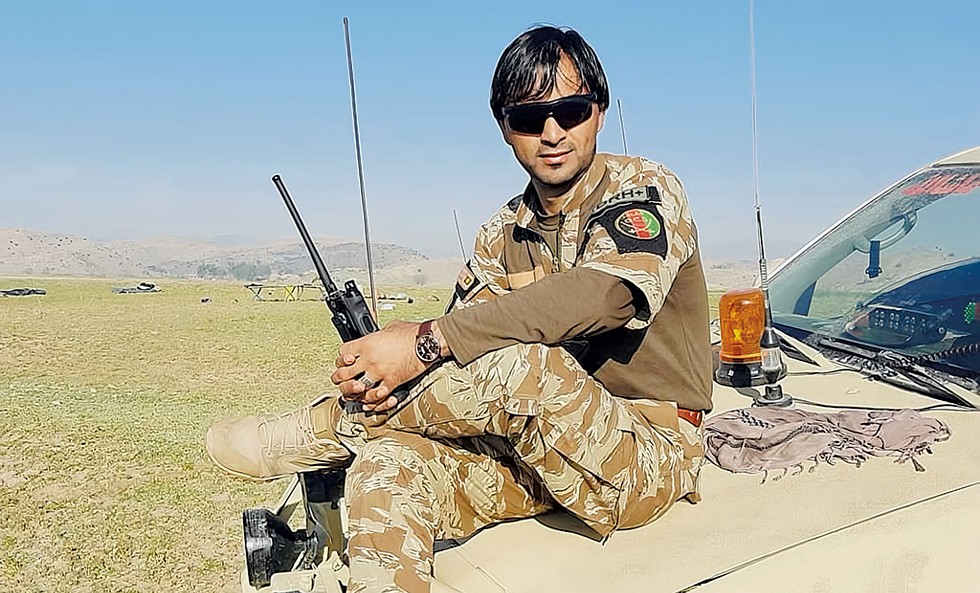
- Courtesy
- Rafiqullah in Afghanistan
The rhythms of Amir's existence follow a deadening sameness.
He awakens on a mattress in the living room of the Burlington apartment that he shares with four other Afghan men. His roommates sometimes sleep in, so he must tiptoe around their beds to reach the shared bathroom.
In the afternoon, he catches a ride to St. Albans, 35 minutes away, for work at a company that readies men's suits for shipment to department stores. He keeps track of the inventory, fills boxes with finished suits and loads trucks from inside a windowless warehouse. He works as many hours as he can get, sometimes 60 a week, in order to earn enough to send some money back home to his family in Afghanistan.
It is often past midnight by the time he returns to Burlington. If he has the energy, he calls his wife and listens longingly for news about his nine children. When they run out of things to say, he feels his way through the darkness for his mattress, trying once again not to disturb the others. Then he searches for sleep.
"Tomorrow, same thing," Amir, 45, said in Pashto through an interpreter. He sat hunched over, displaying a head of dark hair, gone thin. "This is not a life."
Amir, who asked to be identified by a nickname to protect his relatives in Afghanistan, is among dozens of Afghan men living in Vermont who were forced to leave behind their families, some of whom remain in hiding or face threats from the Taliban.
Most of these men were members of a clandestine, U.S.-trained counterterrorism unit known as the Khost Protection Force that carried out missions on behalf of the Central Intelligence Agency. They fled their country on the promise that the U.S. government eventually would reunite them with their wives and children. But three years later, almost no families in Vermont have been made whole.
The others grow increasingly discouraged as they endure a long slog through immigration red tape, missing birthdays, funerals and everything in between. A few men have told confidants that they're even considering a return to Afghanistan, despite the potentially fatal consequences.
Americans who worked alongside these U.S.-sponsored soldiers say the government must do more to help them.
"These were our closest Afghan partners and best trained security forces," said Geeta Bakshi, a former CIA officer who spent four years in Afghanistan. Bakshi now runs a suburban Washington, D.C.-based nonprofit called FAMIL, which helps former Afghan soldiers navigate the immigration and integration process. "We have a moral obligation to take care of them, just like they took care of us."
The Khost Protection Force was one of several so-called Zero Units that the CIA created early in the Afghan war to combat the Taliban and al-Qaeda. Fighters were recruited from local militias and trained for night raids and other secret missions. They also provided security in contested areas. Amir's job was to stand in a watchtower and guard a checkpoint.
The units were eventually incorporated into the intelligence agency of the U.S.-backed Afghan government, but the CIA continued to advise them, orchestrating thousands of covert operations over the years.
The units developed a notorious reputation, driven by reports of human rights abuses and alleged war crimes. They were accused of torturing and killing civilians based on poor intelligence and labeled "death squads" by Human Rights Watch. (The CIA has denied the allegations, chalking them up to Taliban propaganda.)
As obvious targets following the Taliban takeover, Zero Unit members were instructed to flee the country, and about 10,000 of them — from soldiers and officers to interpreters, cooks and mechanics — would ultimately make it to the U.S.
An estimated 100 former KPF men now reside in Vermont, roughly half of whom are crowded into the same Burlington apartment complex where Amir lives. They were admitted to the country on what is known as humanitarian parole, which allows them to live and work for two years. But in order to stay longer — and to bring over family members — they need to secure permanent residency status, known familiarly as a green card.
KPF members are eligible for special immigrant visas, or SIVs, which were created for Afghan nationals who worked on behalf of the U.S. government. Not everyone qualifies: Soldiers must have held their positions for at least a year, but the withdrawal came before some, including Amir, apparently, reached that milestone.
Others who had years of service hastily boarded evacuation planes before they could get required paperwork in order. They are now stuck in a legal limbo while advocates and attorneys try to help them gather the necessary documents.
Confirming KPF members' employment by the U.S. government has been a "nightmare," according to Nathan Virag, an attorney with the Burlington-based nonprofit AALV, which receives government funding to provide free legal counsel for Afghans. "Their previous employers left the country," Virag said. "You can't contact them. You can't track them down."
As one of only two attorneys in Vermont handling Afghan immigration cases, Virag said he lacks enough time to pursue the most problematic SIV applications. Instead, he helps those who are missing documents to apply for asylum, since that will at least give them legal standing to remain in the country beyond two years.
It's a practical workaround but not without downsides.
Asylum seekers must undergo a rigorous vetting process to prove that they would face persecution if they were returned to Afghanistan. But some KPF members are wary of making such a declaration, fearing it would prevent them from ever seeing their home country again. Meanwhile, the short-staffed U.S. Citizenship and Immigration Services has been overrun with asylum petitions, including from people from around the world showing up at the border with Mexico, contributing to a processing backlog.
Amir, who was granted asylum in March, must now wait for the federal government to vet his family reunification petition — a separate process with its own frustrating obstacles, not the least of which includes the fact that there is no longer a U.S. embassy in Afghanistan where people can go for help processing their requests.
The Biden administration has said family reunification remains among its top priorities. But the applications, which need input from at least two federal agencies, have been bogged down. Virag, for instance, has filed more than 100 petitions over the past two years, but only one family has been reunited. KPF men now come into his office regularly to show him pictures of their children and plead for him to do something, anything, to speed up the process.
"They're coming to me saying, 'I'd rather go back and be killed by the Taliban, because at least I could see my family,'" Virag said. He fears the reunification cases will drag on for "years and years."
Among those stuck waiting is Rafiqullah, a slim, soft-spoken former KPF medic who received his green card this year after a successful SIV application.
Rafiqullah, 30, whose last name is being withheld out of concern for the safety of his family in Afghanistan, recalls his decade of service with a mix of pride and grief. He remembers being ordered to leave Khost, the city where he grew up. When he recalled looking back to see the Afghan flag flying above his abandoned base as he fled, he broke down crying.
In Vermont, Rafiqullah has made tentative progress toward a new life. He works at Walmart and drives for Uber, allowing him to practice his nascent English. He shares a two-bedroom Essex apartment with three other Afghans and invites people over whenever he has the chance.
Rushing home to meet a reporter one recent afternoon, he carried a bag full of ingredients for a traditional Afghan meal — quroot, or condensed, salted yogurt, which floated in a bath of oil, surrounded by a mound of sticky rice — and served it up with fresh vegetables purchased from a local farmer. He laughed as an American visitor ventured a hesitant bite. "The more you eat, the happier we are," he said, through an interpreter.
He imagines raising his family in Vermont, where his two daughters could graduate from high school and attend college without fear.
"This is home now," he said, as if to settle the matter.
Perhaps. But his gaze is still pulled to the other side of the world. When a poet and human rights activist from his own ethnic group, Pashtun, was killed in Pakistan this summer, Rafiqullah helped organize a vigil in Burlington that drew more than two dozen Afghan men. He wore a custom-made T-shirt and recorded cellphone videos as attendees shared tributes between bouts of speaker-crackling Afghan music.
As he goes on waiting for word on when his family might join him, he does what he can to keep them safe from afar. He arranged for their passports to be hidden so that they cannot be confiscated by the Taliban. He calls home daily and traces the moves of his wife and children as they bounce from one home to another in a bid to avoid detection.
His wife was pregnant with the couple's fourth child when he left the country. Rafiqullah has never met the girl, who is now 3. His wife sometimes puts her on the phone.
"I'm your father," he tells the child, hoping she understands.
— Colin Flanders
'In Afghanistan, there was no hope.'
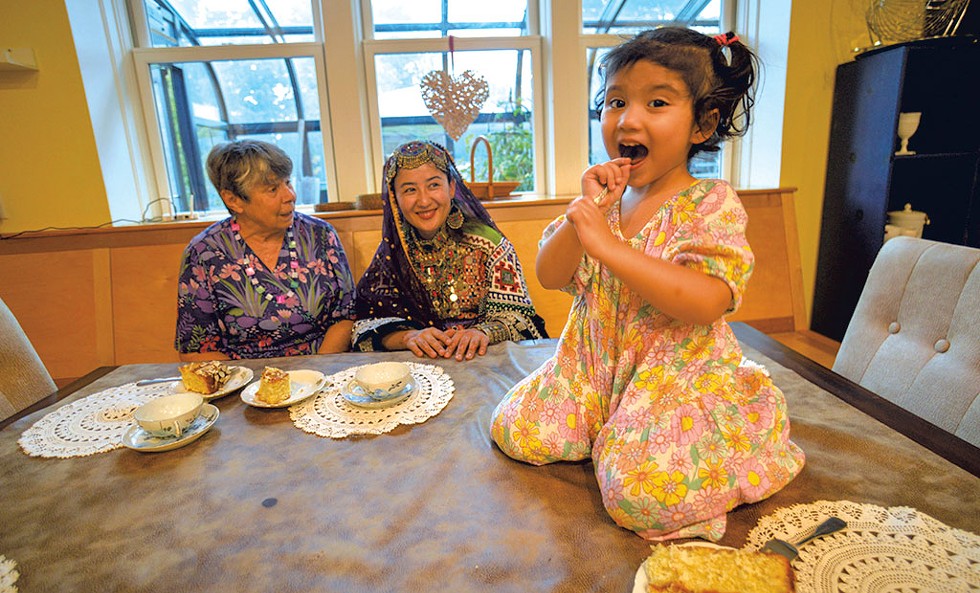
- Kristopher Radder
- Linda Hay and Sohaila Nabizada watching Manahal Amiri enjoying some of Nabizada's leftover wedding cake
On a sunny July day in Brattleboro, eight Afghans sat around a table in a converted pipe organ factory and talked about snow, sleet, ice and hurricanes. The refugees, who had arrived only weeks earlier, were learning English vocabulary words.
The class, held several days a week in Brattleboro's Multicultural Community Center, included students who might never have rubbed elbows in their home country. A middle-aged male journalist from Kabul sat beside a shy woman from the Afghan countryside, her ruddy face cradled by a snug hijab. A 19-year-old with a wispy mustache, running shoes and skinny jeans explained, in halting sentences, that he wanted to visit New York City, which he'd only seen in American movies.
In the hallway outside, 27-year-old Sohaila Nabizada scrolled on her phone, dressed in a stylish red blouse, jewelry and white headscarf. Nabizada, an ethnic Tajik who is fluent in English, as well as Dari and Pashto, two of the most commonly spoken languages in her home country, worked for years in Afghanistan for the National Endowment for Democracy, an American nongovernmental organization. A former debate coach, she once taught Afghan women about civil liberties available to women in free societies. When Kabul fell to the Taliban, her activism put a target on her back. For weeks she hid from Taliban enforcers who repeatedly visited her home and interrogated her neighbors. Then she fled Afghanistan on her own.
"I knew it would be hard for me," she said. "I took the risk to leave the country with an unclear future but with more hope. In Afghanistan, there was no hope."
The largely rural communities of southern Vermont had never received refugees for resettlement before the initial wave of 100 Afghans, including Nabizada, arrived in Brattleboro in January 2022. For decades, nearly all Vermont-bound refugees from around the world had been accommodated in Chittenden County. But faced with the sheer scale of the Afghan evacuation, the Ethiopian Community Development Council, one of 10 official resettlement agencies in the U.S., hired its first staff members for a new office in Brattleboro, its most rural site in any state. Within a year, one of every 100 Brattleboro residents was Afghan.
Refugee resettlement in small, rural communities like those in southern Vermont presents unique challenges. Resources such as public transportation, schools, housing and employment are spread thin, and a more developed network of professional refugee services lies several hours away. Nonetheless, it appears to be working for those in Brattleboro and Bennington, who have benefited from the efforts of local volunteers who provide food, jobs, driving lessons and friendships. That approach has drawn notice far outside Vermont: U.S. Secretary of State Antony Blinken cited southern Vermont as a model for refugee resettlement in rural communities across the country.
Nabizada said she found her new neighbors to be not only accepting but also "keen to learn about a different culture."
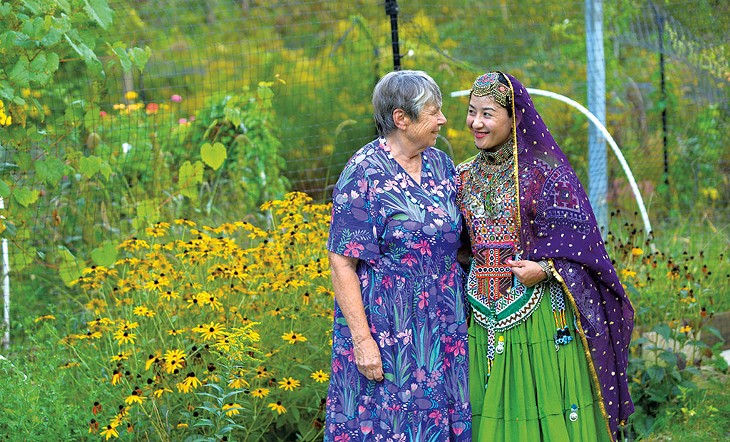
- Kristopher Radder
- Guilford resident Linda Hay and Sohaila Nabizada, an Afghan refugee
Those who work alongside them say the effort has also relied to an unusual degree on the Afghans themselves, who have stepped into leadership roles to assist fellow refugees, including those from other countries. They've helped new arrivals get entry-level jobs at a timber mill, a frozen pizza plant, a yogurt factory, a trucking firm. Others work as support staff at Brattleboro Memorial Hospital.
For employers, who've struggled for years to fill jobs as Vermont's workforce ages out, the sudden influx has presented opportunities and challenges. Many of the new arrivals speak little English and lack skills and credentials. Others are overqualified: One young surgeon from Kabul is trying to restart his medical career by drawing blood as a phlebotomist in Bennington. His mother, who founded and was principal at a girls' school in eastern Afghanistan, sells food at a monthly pop-up restaurant in Bennington.
"We need them more than they need our help," said Jennifer Stromsten, director of programs for the Brattleboro Development Credit Corporation.
Most new arrivals are living in converted dorms at the School for International Training, an online and study-abroad school that stopped hosting students on its hilltop campus in 2018. ECDC and World Learning, the NGO that runs the Brattleboro college, provide essentials such as food staples, bedding, furniture and help in deciphering a new culture. For refugees who cannot read or write, for example, they created picture books illustrating basic tasks such as how to dial 911, use an ATM, and operate home appliances such as washing machines and microwave ovens.
On Fridays, local farmers visit the campus to drop off free meat, produce and recipes. The health department holds vaccine clinics there, and MOOver, southern Vermont's free transit system, ferries refugees to work, school and the supermarket. Children pedal donated bikes around the 82-acre grounds. In mid-October, the multicultural center will relocate to the SIT campus to cluster social services in one location.
A 31-year-old native Afghan who agreed to be identified only by his first name, Amir, a common name in Afghanistan, had experience aiding refugees before he arrived in Brattleboro in early 2022. In Kabul, he used to work with displaced Afghans, mostly ethnic minorities who had been deported from nearby countries such as Iraq, Iran and Pakistan. When the Afghan capital fell in 2021, Amir was evacuated by the U.S. military along with his older sister, a nurse-midwife employed by the Afghan military. A Taliban blockade around Kabul forced the siblings to flee without their spouses, whom they haven't seen since.
The pair had faced danger in Afghanistan even before the Taliban reclaimed power because they belong to the widely persecuted Hazara ethnic minority and Shia branch of Islam, said Amir's sister, who asked to be identified only by her initials, Z.M. "Even before the Taliban, we were not as safe as the rest of the people," Z.M. said in Dari, as her brother translated.
Amir, who was finishing his MBA studies in Kabul before fleeing, has enjoyed a relatively smooth transition to life in the U.S. Though he said he prefers formal business attire, Amir arrived at a recent interview in shorts, a T-shirt and sandals. He'd just come from a meeting with several young Afghans he's helping to train as truck drivers. As part of his work for the Brattleboro Development Credit Corporation, Amir, who is fluent in English, translated the state's official driving manuals into Dari and Pashto to help Afghans — exclusively men thus far — get their commercial driver's licenses. A trucker shortage has created bottlenecks for many Vermont businesses, and Afghans with commercial licenses can earn good wages, even with limited English.
Z.M. has been unable to return to her work as a nurse-midwife. Though she spent a decade in a hospital delivering babies, often through difficult labors, her Afghan medical credentials aren't recognized here. For now, Z.M. works as a licensed nursing assistant at a Brattleboro nursing home. Once her English improves, she plans to return to school.
More pressing for the siblings, though, is getting their families out of Afghanistan.
"It's not just about living apart from each other. It's about their safety as well," Amir said. "They are at a very high risk living there. They have to constantly change their locations in order to just stay alive."
— Ken Picard
In the Driver's Seat
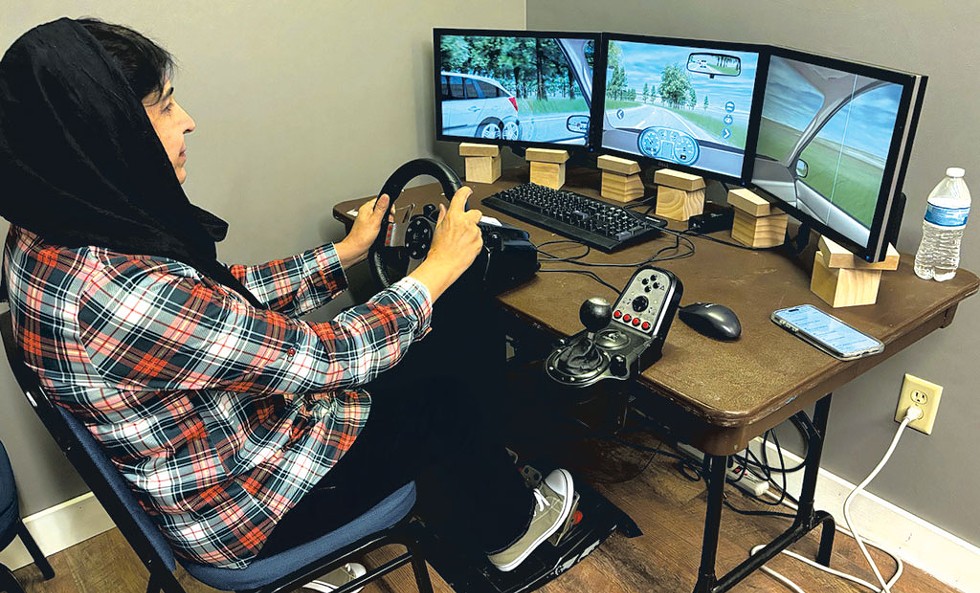
- Ken Picard ©️ Seven Days
- Zarghoona Jalalzoy driving via a simulator
An hour away in Bennington, Jalalzoy, the former adviser to Afghanistan's parliament, sat at the steering wheel of a driving simulator and navigated a digital highway. Jalalzoy was accustomed to being driven around in her previous jobs as a government official in Kabul. Like most Afghan women, including professionals who routinely traveled overseas, Jalalzoy never learned to drive.
Since landing in Vermont, Jalalzoy has been one of four Afghans working on the staff of ECDC's second office, in Bennington. She helps the city's 75 or so refugees find work and housing and solve day-to-day problems such as paying rent and utility bills. And, with her civil servant background, Jalalzoy can take on projects such as writing grant proposals.
"Refugee resettlement in Bennington, for all intents and purposes, is being led by Afghans," said Jack Rossiter-Munley, who runs ECDC's multicultural community center out of a former dance studio downtown.
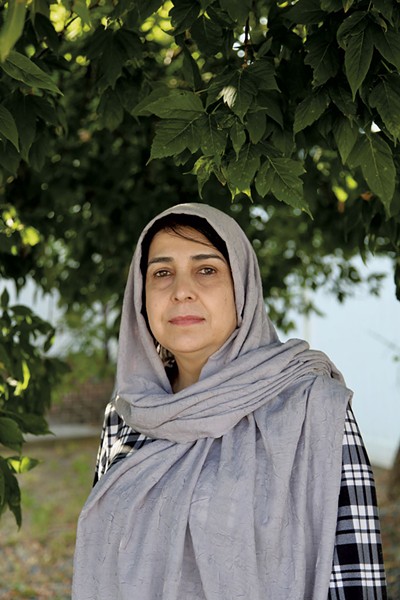
- Jana Sleeman
- Zarghoona Jalalzoy
The soft-spoken Jalalzoy, 48, seems content helping her fellow asylees — for the moment. But her gentle smile belies a fierce determination to resume her career in public policy. "I have big projects in mind," she said.
Last weekend, she completed a practical step; she passed her road test.
Jalalzoy is awaiting a green card and appears eager to prove her mettle in the workplace. "I want the people to know how much work this Afghan woman can do," she said, with a confident air.
Still, Jalalzoy doesn't sleep well at night. Her older son and daughter remain in Turkey awaiting U.S. visas, and Jalalzoy fears that they could be deported to Afghanistan any day.
"How can a mother and father be calm if their children are not with them?" she asked.
Musa Muslim Yar and his wife, Zakia, got separated from two of their three sons during the chaotic airport evacuation in Kabul. Musa, 46, had worked as a security guard at the U.S. embassy. They ended up leaving on a military plane without the teenage boys. In February, after an agonizing three-year separation, the family was finally reunited at John F. Kennedy International Airport in New York City.
Neither Zakia nor her husband had learned to read or write in Afghanistan. Despite that, Zakia, 38, has started a home-based catering business selling Afghan meals to the Bennington community. Musa's carpentry skills landed him a job with a weatherization project at BROC Community Action, a Bennington nonprofit.
Southern Vermont's Afghans have forged some notably tight bonds among their new neighbors. A case in point is Nabizada, the former debate coach, and Linda Hay, a longtime resident of Guilford. When Hay, a 76-year-old retired librarian and teacher, learned through her church that refugees from Afghanistan were due to arrive in early 2022, she opened her home to three young women. One of them, Nabizada, has lived with her ever since.
The landlord-tenant relationship blossomed into much more. When Nabizada began dating a fellow refugee she knew from her college days in northern Afghanistan, she found herself confiding in Hay. Nabizada now calls Hay "Mama" — but only after asking permission from her parents in Afghanistan — and Hay refers to the Afghan as her daughter.
Earlier this month, Nabizada and her fiancé, Abdul Ghafar Sultani, were married in a traditional Afghan ceremony in Hay's living room. With no spouse or children of her own, Hay gave the newlyweds heirlooms from her own family as wedding gifts, including a 19th-century teapot that they now use to serve saffron tea. The couple plan to buy half of Hay's house to help her cover property taxes. "The three of us became a family," Hay said.
Even in her new life in Vermont, Nabizada has continued communicating, online, with women in Afghanistan, many of whom are in hiding and no longer allowed to attend school.
Nabizada still teaches them to debate — in English.
— Ken Pcard

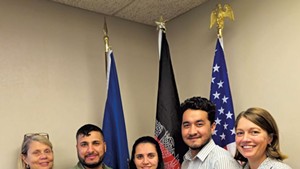


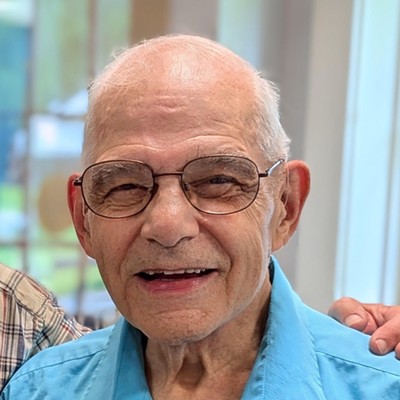
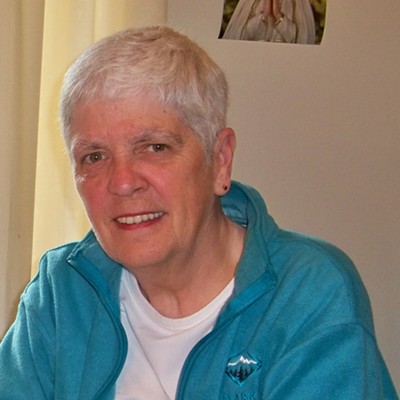
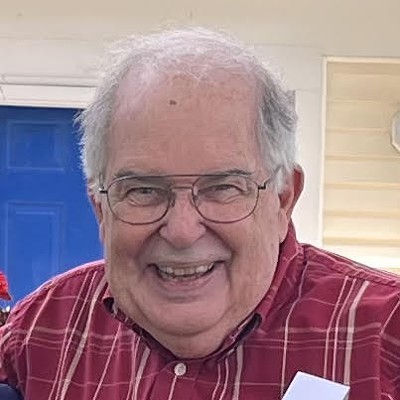
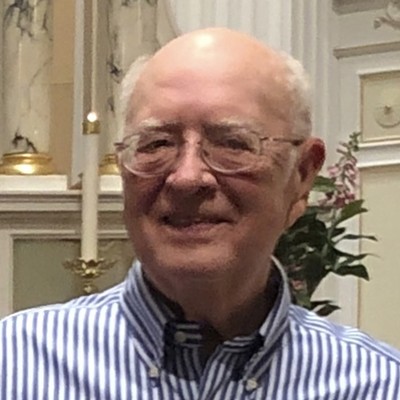
Comments
Comments are closed.
From 2014-2020, Seven Days allowed readers to comment on all stories posted on our website. While we've appreciated the suggestions and insights, right now Seven Days is prioritizing our core mission — producing high-quality, responsible local journalism — over moderating online debates between readers.
To criticize, correct or praise our reporting, please send us a letter to the editor or send us a tip. We’ll check it out and report the results.
Online comments may return when we have better tech tools for managing them. Thanks for reading.